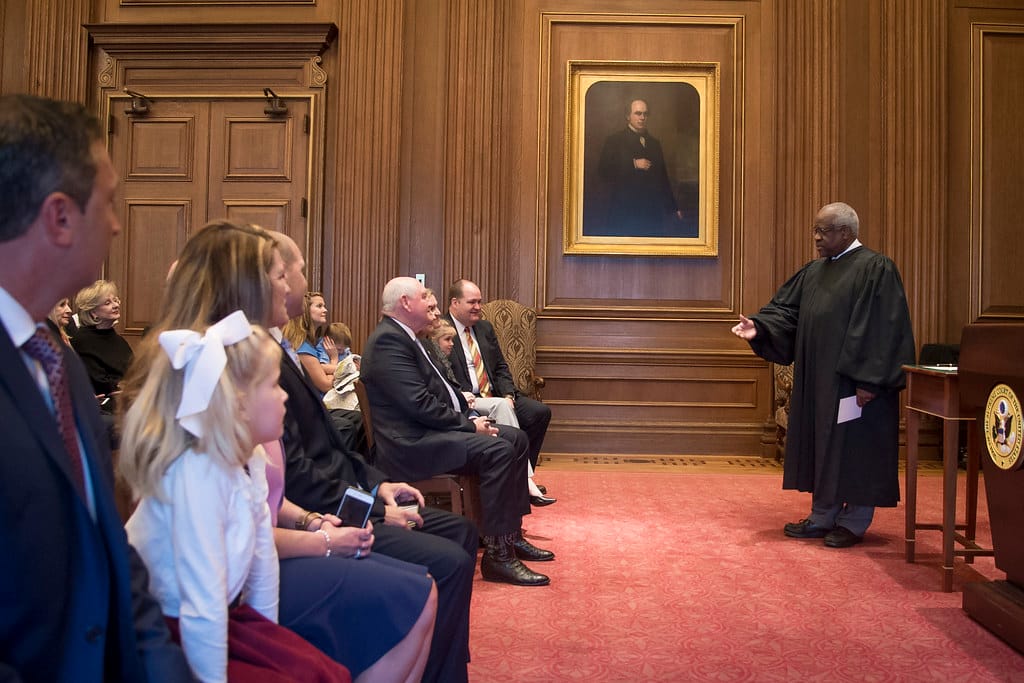Section 230 Reexamination, Tech Continues Russia Retaliation, 4.9 GHz Centralization
Supreme Court Justice Clarence Thomas said Section 230 needs to be reviewed in light of Facebook case in Texas.
Benjamin Kahn

March 7, 2022 – Supreme Court Justice Clarence Thomas issued a statement Monday calling for a reexamination of tech platform immunity protections following a Texas Supreme Court decision that said Facebook was shielded from liability in a trafficking case.
The Texas court ruled in Jane Doe. V. Facebook that the company was shielded from any liability as it was “afforded publisher immunity” in accordance with Section 230 of the Communications Decency Act of 1996, even though the platform “knows its system facilitates human traffickers in identifying and cultivating victims,” and did not take “reasonable” steps to address these concerns.”
In response to the decision, Thomas said, “This decision exemplifies how courts have interpreted [Section] 230 ‘to confer sweeping immunity on some of the largest companies in the world.’ It is hard to see why the protection [Section 230] grants publishers against being held strictly liable for third parties’ content should protect Facebook from liability for its own ‘acts and omissions.’
“At the very least, before we close the door on such serious charges, we should be certain that is what the law demands,” he said.
“As I have explained, the arguments in favor of broad immunity under [Section] 230 rest largely on ‘policy and purpose,’ not on the statute’s plain text. Here, the Texas Supreme Court recognized that ‘[t]he United States Supreme Court—or better yet, Congress—may soon resolve the burgeoning debate about whether the federal courts have thus far correctly interpreted section 230.’”
Last year, Thomas said the highest court would have to one day tackle issues involving digital platforms, which he said exercise “concentrated control of so much speech in the hands of a few private parties.”
Tech companies cease operations in Russia
Multiple technology companies have either shuttered their doors or otherwise ceased sales and operations in Russia, representing the latest in continuing economic punishments for the Kremlin’s war in Ukraine.
On Friday, Daniel Alegre, chief operating officer at video game publisher Activision Blizzard, stated “we are announcing that Activision Blizzard will be suspending new sales of and in our games in Russia while this conflict continues” in an open letter to employees.
On Sunday, Netflix announced that it would be suspending its online services in Russia. In an effort to curb disinformation on its platform, TikTok announced that it would not allow users to upload new videos from Russia.
On Tuesday, Apple announced that it would not longer sell its products in Russia, and Meta stated that it would block certain state-sponsored “news” websites such as RT from being shared on the platform. Twitter also said that it would be taking steps to deemphasize Russian state media. In response to these actions, Russia banned bother services on Friday.
Intel, Microsoft, Google, Roku, and Spotify have also all taken actions against Russia in response to the ongoing situation in Ukraine.
Think tank pushes 4.9 GHz centralization
A Washington D.C. think tank is this month pushing the economic benefits of the Federal Communications Commission’s proposal to improve emergency response services by allocating a slice of the 4.9 GHz band under the centralized authority of the proposed entity designated for that purpose.
The Phoenix Center for Advanced Legal and Economic Public Policy Studies published a bulletin this month that a block of the 4.9 GHz spectrum should be put under the auspices of the FirstNet Authority, which the FCC proposed in October 2021 to be the body to set rules for governing access to the band. The bulletin said this centralization would yield $34 billion in gross domestic product and create 160,000 new jobs.
In their analysis published on Monday, economic policy analysts from the Phoenix Center argued that the centralized model outlined by the FCC has “economic support” and lambasted the decentralized model of state-level management that has allegedly created problems for emergency response, such as interference and congestion, the Phoenix Center said.
The analysis explained that historically, first responders have struggled to coordinate communications infrastructure, as it was often structured on an agency-by-agency or jurisdictional basis. Analysists said that this inability to coordinate was most obvious from the terror attacks on September 11, 2001, when they say that an inability to communicate contributed to the deaths of 343 firefighters.








Member discussion